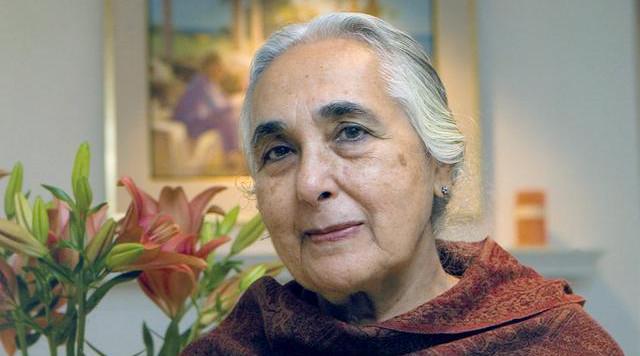Romila Thapar: “A Healthcare System Covering Everyone Must be Put in Place”

Communicable diseases have existed alongside humankind since centuries. However, epidemics and pandemics have a more recent history, with humanity's shift to agrarian life, which has led them to be in close quarters with one another. As human civilisations rose, a myriad contagions began to plague the species – from the Black Death, malaria, tuberculosis, small pox, yellow fever, cholera, to newer ones like Nipah, Zika, SARS, COVID-19, and many more.
Epidemics have altered the course of history in more ways than one, since they have given rise to certain socio-political and cultural developments. They produce specific vulnerabilities and issues in every society. "To study them [epidemics] is to understand society's structure, its standard of living, and its political priorities", says medical historian Frank Snowden. They have had a significant effect on personal relationships, art, literature, and reinforced inequalities and discrimination of various kinds across the world.
To make sense of all this, the Indian Cultural Forum begins a mini-series with Indian historians. In the first feature, Mukulika R speaks to Romila Thapar about democracies during pandemics, and imagining a post-COVID-19 world.
Mukulika R (MR): The Epidemic Diseases Act of 1897 implemented multiple medical surveillance measures like plague passports, exemption certificates, and even detentions. The colonial Act was invoked by PM Modi last month, allowing for similar inspection and segregation to deal with the current pandemic. In fact, IT experts have raised concerns about the central government’s mobile application "Aarogya Setu" for alleged privacy/data breach. Do pandemics feed into the creation of super surveillance states or a "coronopticon" and how?
Romila Thapar (RT): I know little about the EDA of 1897 and its after effects. In my area of study — the history of the more remote past — there was of course no such legislation. But to invoke an Act that was passed 123 years ago does suggest a lack of historical understanding by which I mean that societies and technologies change and cannot be treated as static. However, since so much of the thinking of those in authority these days is rooted in colonial beliefs, it is not surprising that that is where some turn to. It doesn't take a historian to point out that not only has the system of government changed in 123 years but so has the technology and the way it is used. We no longer have an authoritarian colonial government and we maintain that we are a democracy.
Democracies generally do not base their functioning on anything beyond a general surveillance that does not require advanced technology. Surveillance measures or any other kind of orders for that matter are best not imposed in the facile way as was done in 1897. Orders can rebound unless the consequences are not foreseen in some detail. This has been amply demonstrated in the order for the initial lockdown, which because it was not done with enough time and thought, has resulted in immense problems for the society, the economy and the administration. These are the problems that will first have to be attended to now.
Surveillance in 1897 involved some amount of paperwork based on personal enquiries and that was about all. The 'Aarogya Setu' of today, based on current technology, can probe intensively into a person's life and activities, way beyond what was possible in the 1897 Act. And certainly way beyond what is required in checking a Covid-19 patient or potential patient. Can we trust those that today are probing, to probe thus far and no further?
The reaction to the lockdown is clear from the millions on the roads in the worst possible conditions, walking back to their distant villages. A sensitive humanitarian system would have organised transport, food and shelter for those wishing to go home. But to do that one has to see them not as numbers, or collective labour, but as men and women like all of us. People without the basic necessities and without regular means of livelihood now face a gigantic crisis in their lives in a variety of ways. They cannot be dictated to and prevented from doing something as simple as wanting to go home. They were attempts to detain many by force – because of the fear that it would affect the economy. Are Indians not free citizens who can work out their own reasons for choosing where and how they want to live?
Also Read: The outbreak of plague in Bombay, 1896
Knowing that they had been on the roads for many days and had no money they were then asked to pay train fares to get onto a train. Food which is bulging in the granaries could not be supplied to them in sufficient quantity. There is little explanation as to why. Is this what it means to be human and to live in a society supposedly well-governed. Any one could have predicted that in a lockdown those without food and wages would be the first that would want to go where they thought they would get food and shelter – their homes in the villages.
MR: Historians have argued how anti-plague measures in colonial Bombay were tools for repression (policing of the poor) and to establish socio-political hegemony (of Western medicine etc). At the same time, it's also argued that resistance to colonial measures, including medicine, to contain the epidemic, also laid foundations for nascent Hindu consciousness in such cities, also as part of the nationalist discourse. Do you see a similar rise of hegemonic discourses in the context of the current pandemic?
RT: As for the hegemonic discourse, we did have a first taste of this which has not died down. It could get bigger judging by how it was expressed on different occasions: after the meeting of the Tabliqi Jamaat; during and after the riots organised in North-East Delhi; the speeches of politicians calling for the shooting of the bastards. Coming as it did with the pandemic, this is a discourse that will not fade out in a hurry. Another discourse concerns people from the North-east against whom there is also hostility. Is it only because they look different which is the explanation often given, or is there another major difference too — many are Christians?
MR: We have witnessed how scapegoating and certain prejudices get exacerbated in times of such crises (Jews during the plague in Europe; Muslims in India and Blacks in America currently; racism against India during the cholera outbreak, China now) on the one hand, and how power equations (class, gender etc) get reinforced on the other. Could you explain this situation?
RT: The scapegoat is necessary to authoritarian regimes. A community is picked, is said to be the enemy within since historical times, and hatred is directed against it. Oppressing that community gives the regime the opportunity to do so to others, especially those that object to the oppression of the scapegoat. This was so clearly demonstrated in the oppression of the Jews under the Nazi regime in Germany, as indeed it has been demonstrated elsewhere as well. It is now a recognisable pattern.
MR: Epidemics are considered by many to be capable of altering the course of history and opening new worlds, by stirring up demographic, economic, social, and cultural changes, often citing that the European Renaissance took birth in the devastation caused by the plague. Do you agree with the argument that the pandemic is a portal?
RT: The fact that we as societies, are still continuing on our various historical paths, and that these paths and whatever changes have occurred in them, have been explained by historians without giving much space to epidemics, would suggest that a pandemic may not change history too drastically. But this may be because historians — barring a very few — have not so far paid too much attention to the after effects of epidemics. Most previous epidemics have been geographically more limited to one or two continents, such as the Black Death and the Spanish 'flu. COVID-19 has spread far more widely. And beyond the epidemic, it is the global economy that has been hit by it.
Also Read: The Shadow Pandemic in India
There are three areas that have the potential of being changed by this pandemic.
1. Globalisation and neoliberalism have been criticised and may hopefully have to be discarded so that governance can do what it was meant to do, that is, to ensure basic human rights and social security to all citizens at all times. Food, water, jobs, health care, education and social justice for all have to be guaranteed and maintained by whichever government is in power. This could require a massive surveillance of all governments and their functioning. The problem is finding the people to do this. International agencies lack the power. Eventually the power has to come from those being governed, who as citizens have the right to question the functioning of the state. Will they be allowed to do so effectively?
2. A health care system covering all citizens has to be put into place immediately. Without this the epidemic will continue to be around for a few years sustained by the current lack of health and medical facilities. This applies not only to safe-guarding against the epidemic but also providing the basic health care that prevents the spread of the epidemic.
3. The protection of the environment is crucial. Natural ecosystems have to be protected and guarded against encroachment by government agencies and private enterprise. This virus came out of an abuse of natural life and animal life and this abuse has to be stopped, otherwise we shall be open to any number of other viruses.
These measures can be undertaken if we deploy our resources properly. Instead of building detention centres all over for people without documents referred to as migrants, we should be building hospitals and schools. Instead of constructing new high rises on the Central Vista in Delhi for no rhyme or reason, the same money can be contributed to improving the living conditions of those that are below the poverty line, by building them homes and providing water supply. Governments have to be reminded that they are evaluated by the good they do for the people they govern. A well-fed tourist will be impressed by a monument, a hungry day-labourer who hasn't been paid his wages, couldn't care less about a monument.
Romila Thapar is an eminent Indian historian whose principal area of study is ancient India. She is the author of several books including the popular volume A History of India, Vol. 1. She is currently professor emerita at the Jawaharlal Nehru University, New Delhi.
Mukulika R is a member of the Editorial Collective at Indian Cultural Forum, New Delhi.
Get the latest reports & analysis with people's perspective on Protests, movements & deep analytical videos, discussions of the current affairs in your Telegram app. Subscribe to NewsClick's Telegram channel & get Real-Time updates on stories, as they get published on our website.
























